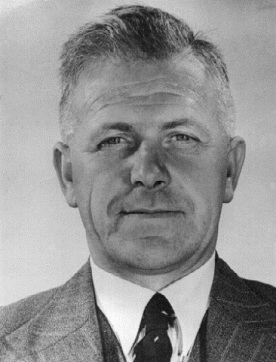Related Research Articles

The Ministry of Defence is the department responsible for implementing the defence policy set by His Majesty's Government, and is the headquarters of the British Armed Forces.

Edwin Duncan Sandys, Baron Duncan-Sandys, was a British politician and minister in successive Conservative governments in the 1950s and 1960s. He was a son-in-law of Winston Churchill and played a key role in promoting European unity after World War II.
Sir Henry Thomas Tizard was an English chemist, inventor and Rector of Imperial College, who developed the modern "octane rating" used to classify petrol, helped develop radar in World War II, and led the first serious studies of UFOs.

Canada has not officially maintained and possessed weapons of mass destruction since 1984 and, as of 1998, has signed treaties repudiating possession of them. Canada ratified the Geneva Protocol in 1930 and the Nuclear Non-proliferation Treaty in 1970.

The Quebec Agreement was a secret agreement between the United Kingdom and the United States outlining the terms for the coordinated development of the science and engineering related to nuclear energy and specifically nuclear weapons. It was signed by Winston Churchill and Franklin D. Roosevelt on 19 August 1943, during World War II, at the First Quebec Conference in Quebec City, Quebec, Canada.

The European Defence Agency (EDA) is an agency of the European Union (EU) that promotes and facilitates integration between member states within the EU's Common Security and Defence Policy (CSDP). The EDA is headed by the EU High Representative for Foreign Affairs and Security Policy, European Commission’s Vice President (HR/VP), and reports to the Council. The EDA was established on 12 July 2004 and is based in Brussels, Belgium, along with a number of other CSDP bodies.

The Atomic Energy Act of 1946 determined how the United States would control and manage the nuclear technology it had jointly developed with its World War II allies, the United Kingdom and Canada. Most significantly, the Act ruled that nuclear weapon development and nuclear power management would be under civilian, rather than military control, and established the United States Atomic Energy Commission for this purpose.
The Committee of Imperial Defence was an important ad hoc part of the Government of the United Kingdom and the British Empire from just after the Second Boer War until the start of the Second World War. It was responsible for research, and some co-ordination, on issues of military strategy.
Imperial Preference was a system of mutual tariff reduction enacted throughout the British Empire as well as the then British Commonwealth following the Ottawa Conference of 1932. As Commonwealth Preference, the proposal was later revived in regard to the members of the Commonwealth of Nations. Joseph Chamberlain, the powerful colonial secretary from 1895 until 1903, argued vigorously that Britain could compete with its growing industrial rivals and thus maintain Great Power status. The best way to do so would be to enhance internal trade inside the worldwide British Empire, with emphasis on the more developed areas — Australia, Canada, New Zealand, and South Africa — that had attracted large numbers of British settlers.
The Australian Intelligence Community (AIC) and the National Intelligence Community (NIC) or National Security Community of the Australian Government are the collectives of statutory intelligence agencies, policy departments, and other government agencies concerned with protecting and advancing the national security and national interests of the Commonwealth of Australia. The intelligence and security agencies of the Australian Government have evolved since the Second World War and the Cold War and saw transformation and expansion during the Global War on Terrorism with military deployments in Afghanistan, Iraq and against ISIS in Syria. Key international and national security issues for the Australian Intelligence Community include terrorism and violent extremism, cybersecurity, transnational crime, the rise of China, and Pacific regional security.

Lieutenant General Kunhiraman Palat Candeth, PVSM was a senior officer in the Indian Army who played a commanding role in the Liberation of Goa from Portuguese control in 1961, and briefly served as the Military Governor of Goa, Daman and Diu.

The Ministry of Defence (MoD) is charged with coordinating and supervising all agencies and functions of the government relating directly to national security and the Indian Armed Forces. The President of India is the ceremonial commander-in-chief of the armed forces of the country. The Ministry of Defence provides policy framework and resources to the armed forces to discharge their responsibility in the context of the defence of the country. The Indian Armed Forces and Indian Coast Guard under the Ministry of Defence are primarily responsible for ensuring the territorial integrity of India.
Pervaiz Iqbal Cheema was a Pakistani political scientist, cricketer, and a professor of International Relations and was last working as Dean, Faculty of Contemporary Studies, National Defence University, Islamabad - Pakistan.

The Gen 75 Committee was a committee of the British cabinet, convened by the Prime Minister, Clement Attlee, on 10 August 1945. It was one of many ad hoc cabinet committees, each of which was convened to handle a single issue, and given a prefix of Gen and a number. The purpose of the Gen 75 committee was to discuss and establish the British government's nuclear policy. Attlee dubbed it the "Atom Bomb Committee". It was replaced by an official ministerial committee, the Atomic Energy Committee, in February 1947.

The Chief of the Air Staff is a military appointment and a statutory office held by an Air Chief Marshal in the Pakistan Air Force, who is appointed by the Prime Minister of Pakistan and final confirmation by the President of Pakistan. The CAS is the highest-ranking officer of the Pakistan Air Force and only pilots are appointed in this post.

The Ministry of Defence, is an executive ministry of the federal Government of Pakistan, tasked in defending national interests and territorial integrity of Pakistan. The MoD oversees mission execution of its policies and supervises all agencies of the government directly related to the national security and the Pakistan Armed Forces.

Sir Leslie Harold Martin, was an Australian physicist. He was one of the 24 Founding Fellows of the Australian Academy of Science and had a significant influence on the structure of higher education in Australia as chairman of the Australian Universities Commission from 1959 until 1966. He was Professor of Physics at the University of Melbourne from 1945 to 1959, and Dean of the Faculty of Military Studies and Professor of Physics at the University of New South Wales at the Royal Military College, Duntroon, in Canberra from 1967 to 1970. He was the Defence Scientific Adviser and chairman of the Defence Research and Development Policy Committee from 1948 to 1968, and a member of the Australian Atomic Energy Commission from 1958 to 1968. In this role he was an official observer at several British nuclear weapons tests in Australia.

The Polish Institute of International Affairs in Warsaw is a Polish think tank which carries out research and training in international relations. In this field, it ranks as one of the most influential think tanks not just in Central and Eastern Europe but in the European Union as a whole.

High Explosive Research (HER) was the British project to develop atomic bombs independently after the Second World War. This decision was taken by a cabinet sub-committee on 8 January 1947, in response to apprehension of an American return to isolationism, fears that Britain might lose its great power status, and the actions by the United States to withdraw unilaterally from sharing of nuclear technology under the 1943 Quebec Agreement. The decision was publicly announced in the House of Commons on 12 May 1948.

This article outlines the history of the Common Security and Defence Policy (CSDP) of the European Union (EU), a part of the Common Foreign and Security Policy (CFSP).
References
- Agar, Jon; Balmer, Brian (1998). "British Scientists and the Cold War: The Defence Research Policy Committee and Information Networks, 1947-1963". Historical Studies in the Physical and Biological Sciences. 28 (2): 209–252. doi:10.2307/27757795. JSTOR 27757795.